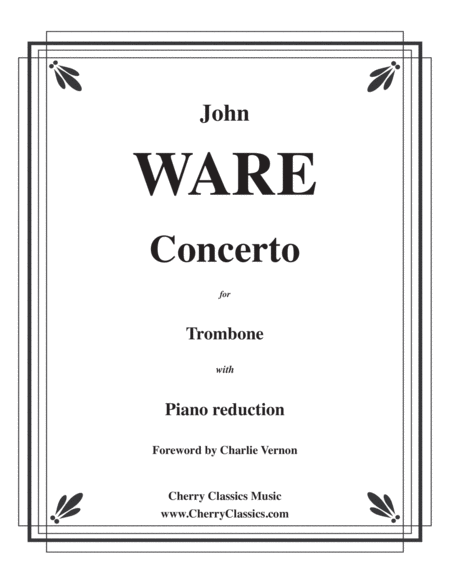Piano,Trombone - Level 5 - Digital Download SKU: A0.810983 Composed by Cherry Classics Music. Arranged by John, W., and Ware. 20th Century,Contemporary. Score and part. 63 pages. Gordon Cherry #4601711. Published by Gordon Cherry (A0.810983). This fine work has sat dormant for many years and has now come to light thanks to the efforts of Charlie Vernon, Bass Trombonist of the Chicago Symphony, who performed this virtuoso work as a young performer. The concerto is in the standard three movement form: Fast, slow, fast. This publication is a reduction from the original orchestral version (to be released at some point in the future). Here is a description of the Concerto by the composer, John W. Ware. I started on the trombone concerto in my junior year studying composition at Indiana University. While working on it, I learned of an opportunity to make it sort of a thesis piece (though students didn't write a thesis in composition while an undergrad). The original version was for trombone with string orchestra, and it was performed by the IU String Orchestra, conducted by Dr. Arthur Corra, with Robert Priez, trombone, as part of my senior composition recital. I thought the performance was quite good (Priez played extraordinarily well), and the piece received a newspaper review in the Indiana Daily Student, in which the reviewer wrote that the work was almost too exciting. I thought at the time that he had given me and my music a fine compliment. I made a piano version of the accompaniment, shortening and tightening the first movement, for performances in 1966; I made a second revision in 1967 for a performance by E. J. Eaton, trombonist at the University of Tennessee at Martin, arriving at the form in which the work exists now. The first movement is in fairly normal sonata-allegro form, in the key of A minor. It alternates between assertive and more thoughtful moods. There is no introduction; the soloist enters immediately and dominates much of the movement. The main theme is--by some manipulation--a source for most of the other themes, and all of the themes are used in close proximity to each other, including contrapuntal combinations, especially near the end. Originally the movement included a lengthy fugato, now much shortened and including a stretto that builds and subsides before a cadenza leading to a coda based on both the principal and secondary themes. Key relations in this movement, as in the other two, are quite free and often chromatic, with frequent third-relations; but returns to the tonic at the end are emphatic. The writing is challenging for both soloist and accompanist; the piece is substantial, requiring technique and stamina. The second movement is in F minor and is also built on both contrast and close relationships between the main and secondary themes. The main theme is heard in the piano part before the soloist enters. The mood is more lyric than in the first movement, but with dramatic episodes also. In this movement are some definite derivations from themes in the first movement. The ending is a sort of lengthened shadow of the opening. The finale returns to A minor, with themes slightly related to polonaise rhythms, but with strong echoes of first-movement themes. Here, too, dramatic and lyric episodes alternate, with dotted rhythms frequently propelling the music forward. The introduction is a brief and simple preparation for the solo entry. Later in the movement, a very brief, slightly slower section is soon overtaken by the original tempo. Toward the end, there is a second cadenza, again leading to a swift and energetic coda. The work is about 20 minutes in length and is appropriate for advanced performers.
